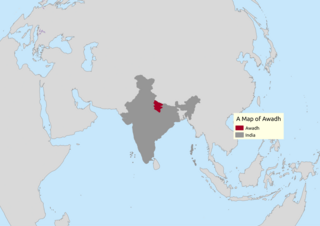
Awadh, known in British historical texts as Avadh or Oudh, is a historical region in northern India, now constituting the northeastern portion of Uttar Pradesh. It is roughly synonymous with the ancient Kosala region of Hindu, Buddhist, and Jain scriptures.

Nawab, also spelled Nawaab, Navaab, Navab, Nowab, Nabob, Nawaabshah, Nawabshah or Nobab, is a royal title indicating a sovereign ruler, often of a South Asian state, in many ways comparable to the western title of Prince. The relationship of a Nawab to the Emperor of India has been compared to that of the Kings of Saxony to the German Emperor. In earlier times the title was ratified and bestowed by the reigning Mughal emperor to semi-autonomous Muslim rulers of subdivisions or princely states in the Indian subcontinent loyal to the Mughal Empire, for example the [[Nawabs of Bengal]

Mirza is a name of Persian origin. It is used as a surname or prefix to identify patriarchal lineage.
Khan is a surname of Turko-Mongol origin, today most commonly found in parts of India, Pakistan, Afghanistan, Bangladesh, and Iran. It is derived from the historic title khan, referring to a military chief or royalty; it originated as a hereditary title among nomadic tribes in the Central and Eastern Eurasian Steppe during antiquity and was popularized by Turkic dynasties in the rest of Asia as well as in Eastern Europe during the medieval period.
Madrasatul Waizeen or Madrasatul Waezeen or Madrasat al-Wa'izin, founded in 1919, is an old centre of Twelver Shia education in the city of Lucknow, India. Many of the clerics attend this school after they finish their graduate educations in other Shia seminaries to strengthen their oratory and preaching skills. It is well-known for the valuable manuscripts in its library.
The All India Muhammadan Educational Conference was an organisation promoting modern, liberal education for the Muslim community in India. It was founded by Sir Syed Ahmed Khan, also the founder of the Aligarh Muslim University. All India Mumammadan Educational Conference was the origin of the All-India Muslim League. The Muslim League was born in the 20th session of All India Muhammadan Educational Conference, which was established by Syed Ahmed Khan in Aligarh in 1886. Muhammadan Educational Conference used to hold its annual meetings in various cities where, by the co-operation of local Muslims, steps were taken for the progress of education.

Mahmudabad, also known as Mahmudabad Awadh is a town and a municipal board in Sitapur district in the Indian state of Uttar Pradesh.

The Imperial Legislative Council (ILC) was the legislature of British India from 1861 to 1947. It was established under the Charter Act of 1853 by providing for the addition of 6 additional members to the Governor General Council for legislative purposes. Thus, the act separated the legislative and executive functions of the council and it was this body within the Governor General's Council which came to known as the Indian/Central Legislative Council. In 1861 it was renamed as Imperial Legislative Council and the strength was increased.

The Council of State was the upper house of the legislature for British India created by the Government of India Act 1919 from the old Imperial Legislative Council, implementing the Montagu–Chelmsford Reforms. The Central Legislative Assembly was the lower house.
Qazi Syed Inayatullah was a scholar of Fiqh from Sakras, District Mewat (Haryana). He belonged to the family of Gardēzī Sadaat.

General elections were held in British India in December 1945 to elect members of the Central Legislative Assembly and the Council of State. The Indian National Congress emerged as the largest party, winning 57 of the 102 elected seats. The Muslim League won all Muslim constituencies, but failed to win any other seats. Of the 13 remaining seats, 8 went to Europeans, 3 to independents, and 2 to Akali candidates in the Sikh constituencies of Punjab. This election coupled with the provincial one in 1946 proved to be a strategic victory for Jinnah and the partitionists. Even though Congress won, the League had united the Muslim vote and as such it gained the negotiating power to seek a separate Muslim homeland as it became clear that a united India would prove highly unstable. The elected members later formed the Constituent Assembly of India.
The Amir-ud-daula Public Library, is a public library in Lucknow, India.
Mohammad Amir Ahmed Khanراجا صاحب محمود آباد, titled as the Raja of Mahmudabad was a prominent politician and leader of the All India Muslim League, during the Pakistan Movement.
Maharaja Sir Mohammad Ali Mohammad Khan, Khan Bahadur, KCSI, KCIE was the Raja of Mahmudabad from 28 June 1903 to 23 March 1931 and a noted politician, zamindar of British India.
Maharaja Sir Mohammad Amir Hasan Khan, Khan Bahadur, KCIE was the Raja of Mahmudabad from 1858 to 27 June 1903 and a noted zamindar of British India.
Gurbakshish Singh (1911-1983) was an Indian politician. He was Member of the Legislative Assembly (MLA) who represented the Barnala Constituency, in Punjab.

Ali Khan Mahmudabad is an Indian historian, political scientist, writer, columnist, occasional poet, and assistant professor of both history and political science at Ashoka University, India. He is the grandson of Mohammad Amir Ahmad Khan, the Raja of Mahmudabad.

Mian is a royal title of the Indian subcontinent, also sometimes used as a surname. Begum or Beygum is used to describe the wife of a Mian. It is used by several monarchs of Indian states.






